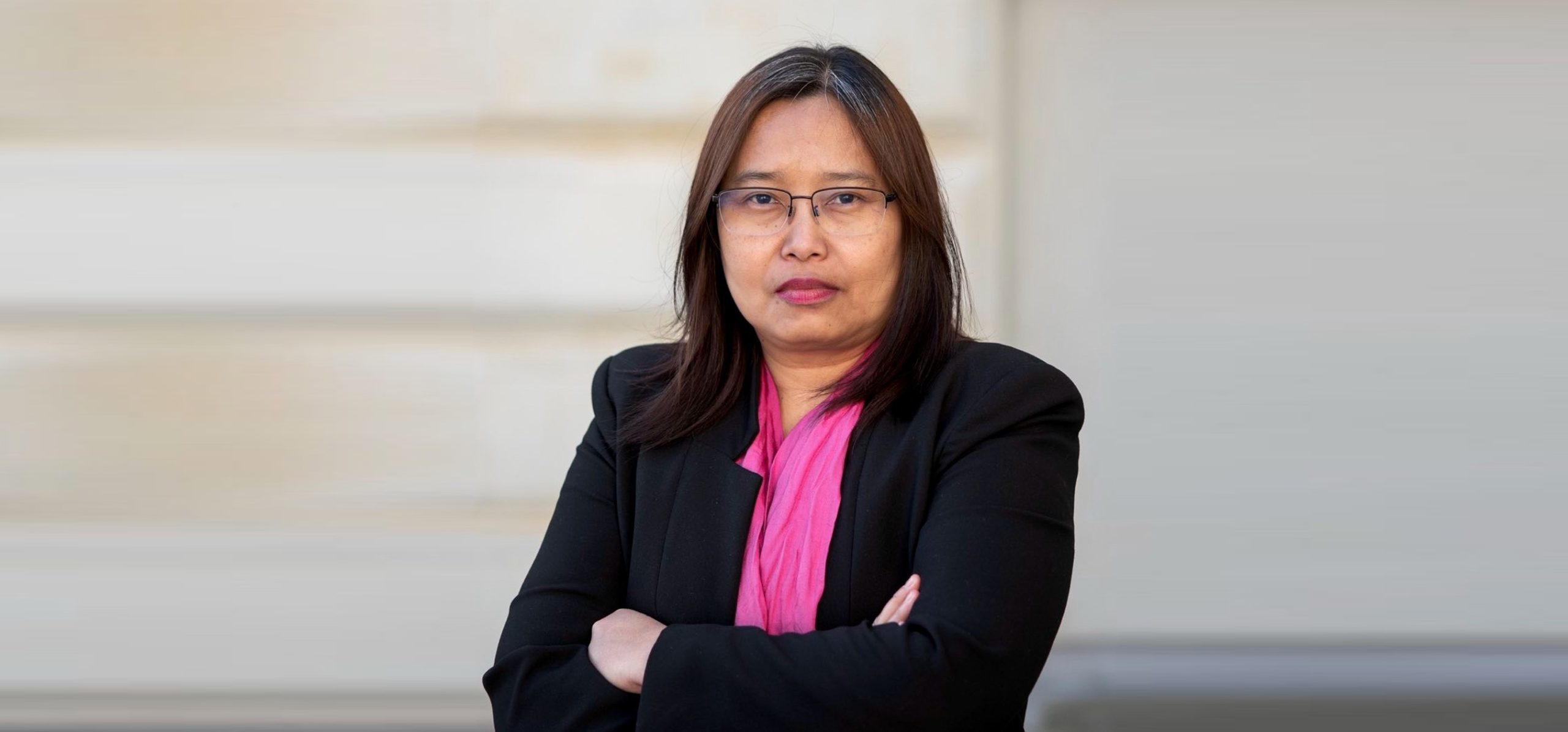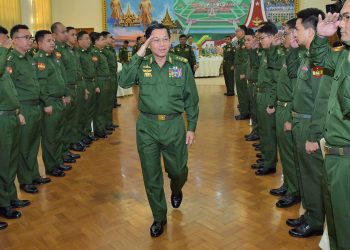Outgoing Thai Foreign Minister Don Pramudwinai said Wednesday he met with detained Myanmar leader Daw Aung San Suu Kyi during a secret visit to Naypyitaw on Sunday, becoming the first international dignitary to be granted permission by the regime to meet her. However, the meeting has caused controversy, as it took place shortly before the start of the ongoing Association of Southeast Asian Nations (ASEAN) ministerial meeting. More importantly, there are questions over whether the caretaker Thai administration’s unilateral action will affect the bloc’s unity and principle of ASEAN centrality. Daw Zin Mar Aung, the foreign minister of the National Unity Government (NUG), Myanmar’s civilian government, discussed these and related issues with The Irrawaddy.
The Irrawaddy: What is the NUG’s response to the Thai foreign minister’s meeting with Daw Aung San Suu Kyi? What do you think of the outgoing foreign minister’s involvement?

Daw Zin Mar Aung: Outgoing Thai Foreign Minister Don Pramudwinai’s meeting with Daw Aung San Suu Kyi has made resolving the Myanmar issue more complicated. He has also made such a mess recently by organizing talks to reengage with the junta. What he has done is in total contrast with ASEAN leaders’ decision not to welcome the regime leadership as long as they fail to honor [the regional bloc’s] Five-Point Consensus on Myanmar. He is now trying to push the junta into the ASEAN fold. His attempts to do so have no legitimacy as he is an outgoing minister in a caretaker government. Only the ASEAN chair or special envoys on Myanmar have a mandate to meet Daw Aung San Suu Kyi. You should note that, before him, there were officials from China and the UN, and ASEAN envoys who sought permission from the junta to meet her. They were all rejected. So, it raises questions as to why the regime allowed Don, who has no mandate to see her, to hold the meeting. We have to ask him seriously: Whom did he represent? What are his responsibilities? Rather than helping to solve Myanmar’s problems, his action has caused disunity among regional countries.
You said Thailand’s action affected ASEAN centrality. Member states like Indonesia and Malaysia take the Myanmar issue seriously and handle it appropriately. Do you know how other member states feel about Thailand’s much friendlier approach to the regime?
Other member states follow the decisions made at ASEAN summits. But they have been undermined by Thailand’s approach to the junta since last year, with Thailand’s introduction of “neighbor diplomacy”, saying it should also lead in tackling the issue as it’s Myanmar’s neighbor. If they make it right by following ASEAN’s Five-Point Consensus, it’s OK. To engage with all stakeholders in the Myanmar issue is one of the requirements. But Thailand has only met with the regime leadership. And now it’s trying to push the bloc to fully reengage with the junta. They are totally ignoring the Myanmar people’s voice and desire. I have learned from diplomatic circles that such actions have made other member states very uncomfortable.
So, the Myanmar junta is using Thailand for its political gain?
As a minister in the outgoing government, Don has to leave very soon. His attempts to push ASEAN to welcome the regime back at the upcoming ASEAN summit could be his last effort… You could say he is trying to save the junta, which is failing on all fronts. In short, you could call it a “Dictators supporting each other until the last minute” scenario by undermining ASEAN’s bedrock principles. The regime leadership is dying to join the upcoming summit and Thailand is helping to make it happen. Let me make it clear that when I say “Thai” here, I’m not referring to ordinary Thai people or previous Thai governments. I specifically mean the current outgoing Thai government, in which Don is foreign minister. I believe his approach to Myanmar represents neither the [views of the] Thai people nor the Myanmar people. I can surely say it only represents the regime.
Everyone knows the current Thai regime is close to its Myanmar counterpart. Then recently it hosted talks to reengage with the junta. Under the circumstances, is it OK to say the meeting between Don and Daw Aung San Suu Kyi was appropriate?
Absolutely not! The first thing is they have no mandate to have such a meeting. The current controversy caused by the meeting is the best evidence that the approach doesn’t work. Second, Don has one-sidedly said he met Daw Aung San Suu Kyi. We still can’t verify that she really received him. If a meeting took place between them, it was bilateral. That means Daw Aung San Suu Kyi has to say something about the meeting. What we have heard is coming only from Don. We have to think about whether it’s appropriate to ask our isolated leader for a meeting or comments [on the National Unity Government (NUG), or its armed wing, the People’s Defense Force (PDF)] and we don’t know whether it was held with her consent. She is not someone who carelessly expresses her political opinions. So, no one knows except her whether she commented on the NUG and PDFs. Neither Don nor anyone else can present her voice. So, hearing about the meeting from just one side [Don], it also makes us worried about whether the regime will keep her behind bars for the rest of her life. If so, her security and life are at risk. You can’t feel safe if you are in the hands of a regime that would do anything to stay in power. The meeting has really increased our concerns about her.
So, the regime has politically manipulated the meeting?
Yes, they arranged it intentionally to use it politically. If they are honest, why didn’t they allow it before? Why just before the ASEAN ministerial meeting this week? The timing is very suspicious as they did it in time for the bloc’s meeting.
Regarding Daw Aung San Suu Kyi’s alleged comments on the NUG and PDFs, PanOrient reported that Daw Aung San Suu Kyi confirmed in the meeting that she neither recognizes nor supports them. But Don didn’t mention that at the ASEAN meeting. Suspiciously, the regime’s Foreign Minister Than Swe received the president of Pan Orient News, Khaldon Azhari, in Naypyitaw in May to discuss matters related to media development and international media. People say PanOrient reports the regime’s views uncritically and that it is disseminating a junta disinformation campaign on the meeting. Any comments?
Daw Aung San Suu Kyi has always said she will never go against the people’s will and she will stand with them. So, for such a person, a question such as whether she supports the NUG or the PDFs is totally unnecessary. Why would she bother to answer such a question? The one thing that’s sure is that the junta is desperately trying to spread disinformation. Yes, the news outlet chief also met with the regime’s minister previously and it’s suspected that it is on the regime’s payroll. Some of their content is quite pro-junta. If the junta wants to know whether she supports the NUG and PDFs, give her the freedom to speak about it of her own free will. For the moment, she may not answer in black or white as she may not be completely aware of the whole situation [as she is in prison]. What they should not forget is Daw Aung San Suu Kyi is still the NUG’s State Counselor. It’s not a just approach to ask her, when you have locked her up.
Interestingly, Don said Daw Aung San Suu Kyi is healthy. There are many political prisoners, including Daw Aung San Suu Kyi, in Myanmar. But he doesn’t seem to have pushed the regime to release them.
It’s hostage diplomacy, if I can put it that way. It’s nothing more than pushing her and cornering her to answer questions in the interests of her captor. The outcome of the meeting will surely have nothing to do with our people’s interests. I have to say the approach has only had negative results.
According to media reports, Don told today’s [Wednesday’s] ASEAN meeting that Daw Aung San Suu Kyi encouraged dialogue without preconditions to address Myanmar’s crisis. What do you think?
They put her in solitary confinement and they relayed “this is what she said.” For me, it’s quite untrustworthy. I have doubts about whether it’s OK to respond to such nonsense. For conditional dialogue, it’d be better to ask the junta. If it has to be “without precondition”, they have to release her. If it has to be unconditional, we need a condition where we can speak freely. The other thing is, unconditional dialogue between who? Resolving Myanmar’s crisis doesn’t just depend on the military and the NLD, nor the military and the NUG. As the military dictatorship is deeply rooted, the country’s problems include the whole range of [issues involving] equality and self-determination of the country’s ethnic people. So, if you want unconditional dialogue, I think it has to reflect all stakeholders’ opinions.
NUG Acting President Duwa Lashi La once said there can be no dialogue with the regime. If it is really needed, he said, there would have to be conditions, like a cessation of killing by the junta, and the military would first have to return to the barracks. Is that still the NUG’s stand? In the past, Daw Aung San Suu Kyi herself called for dialogue. Are there conflicting opinions now?
The Spring Revolution following the 2021 coup resulted from our people’s realization that they needed approaches that were different from the ones used prior to 2021 in solving Myanmar’s problems. People are totally aware that political means alone don’t work. That’s why we have the PDFs—for self defense and to reform the military. As long as you don’t solve the root causes, there will be no national reconciliation… You need to accept principally that there will be no solution as long as the military is involved in the country’s politics.
The other thing is equality for ethnic people and building a federal union. These two things have to go in tandem. Another thing is [ASEAN’s] Five-Point Consensus. True, it can’t fully solve the problem, but if you can’t even implement the consensus, it’s nonsense to talk about dialogue.
Primarily, the regime has to stop its violence and arbitrary arrests of civilians, and release political prisoners. Only after that could we hold discussions, in accordance with our position based on the basic principles mentioned above.
How does Thailand’s approach to Myanmar affect ASEAN centrality? Will there be any repercussions?
I have to say it has largely undermined the group’s centrality. Very recently, [the current holder of] ASEAN’s rotating chair, Indonesia, emphasized the need for unity in the bloc. That’s why I think the Thai approach on Myanmar is an obstacle to the bloc’s centrality. Whether you like it or not, you have to follow the Five-Point Consensus adopted by the ASEAN [leaders]. Many member states think so. Any country that wants to help solve Myanmar’s crisis must stick to the Five-Point Consensus rather than being a one-man show. In Thailand’s case, no one had any idea what it was doing until they revealed it, reasoning that it would go it alone. I would like to urge Thailand as well as others to avoid that approach, as it can be harmful to the bloc’s unity. Now it has caused controversy among member states, causing the Myanmar issue to be tossed into the back seat. Our neighbors should be mindful that it’s caused nothing but harm, not only to Myanmar but also to regional unity. The international community should collectively take action on the issue, I would say.
















